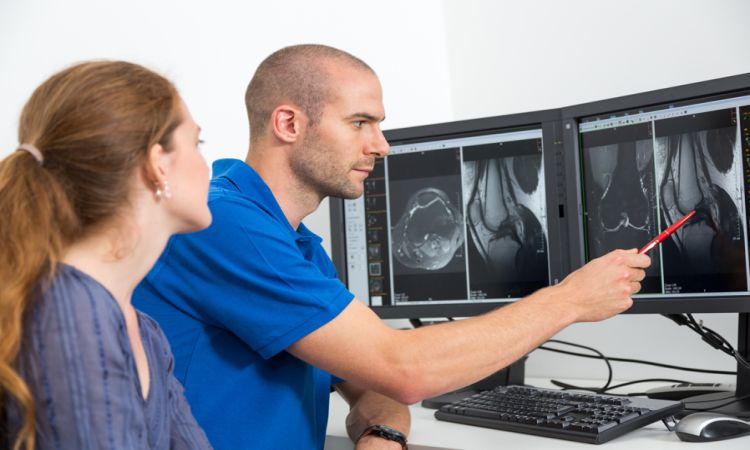 Are you a scientist that wants to improve the world around you? Do you love science, but have a secret longing to be a doctor?
Are you a scientist that wants to improve the world around you? Do you love science, but have a secret longing to be a doctor?
Well, have you ever considered becoming a radiologist?
It might seem like a tough job to pursue, but it is a career you shouldn’t give up on. Get the inside scoop on becoming a radiologist and begin your journey to the top of your field.
Here’s how to become a radiologist:
Steps To Become a Radiologist
Becoming a radiologist is a challenging but rewarding career path. This career requires dedication, hard work, and a passion for medicine. Here are the steps to becoming a radiologist:
Earn a Bachelor’s Degree
The first step towards becoming a radiologist is to earn a Bachelor’s degree from an accredited college or university. Radiologists come from a variety of academic backgrounds, but most have degrees in
- Biology
- Physics
- Chemistry
During your undergraduate studies focus on courses like anatomy, physiology, and medical terminology. This will prepare you for medical school.
Attend Medical School
After completing your Bachelor’s degree, the next step is to attend medical school. Medical school usually takes four years to complete.
During medical school, you will also complete clinical rotations in various medical specialties. These rotations will give you hands-on experience in radiology and help you decide if this is the right field for you.
Complete Residency Training
You must complete a radiology residency program after earning your medical degree. A residency typically lasts four to five years. It involves supervised clinical training in all aspects of radiology, including
- Diagnostic Imaging
- Radiation Therapy
- Interventional Procedures
During your residency, you will work alongside experienced radiologists. You’ll gain practical experience in a real-world medical setting.
Obtain a Medical License
Once you have completed your residency training, you will need to obtain a medical license to practice in your state. This involves passing a series of licensing exams. This includes the United States Medical Licensing Examination. These exams test your knowledge and skills in all areas of medicine and are necessary to obtain a license to practice.
Become Board Certified
To become a board-certified radiologist, you will need to pass the American Board of Radiology certification exam. This exam tests your knowledge and skills in all areas of radiology. Passing this exam demonstrates that you have the necessary expertise to practice radiology independently and make critical decisions that impact patient care.
Consider Fellowship Training
After completing your residency training and obtaining board certification, you may want to consider pursuing fellowship training in a subspecialty of radiology. Fellowship training is a specialized program that provides advanced training in a specific area of radiology, such as
- Neuroradiology
- Pediatric Radiology
- Musculoskeletal Radiology
This additional training can help you stand out in a competitive job market. It will also provide you with additional expertise to treat a wider range of medical conditions.
Know the Skills and Qualities Needed
Becoming a radiologist requires more than just completing the educational and training requirements. Radiologists must also possess certain skills and qualities to be effective in their profession. Here are some of the key skills and qualities needed to become a radiologist:
Technical Skills
Radiologists must have a strong foundation in science and technology. They need to understand how medical imaging equipment works. They also must learn about how to interpret images and how to use computer software to analyze data. Additionally, radiologists must have excellent hand-eye coordination and dexterity to operate equipment and perform interventional procedures.
Communication Skills
Radiologists work closely with:
- patients
- medical professionals
- support staff
They must be capable of efficient verbal and written communication. Radiologists Must be capable of explaining complex medical procedures and results to patients in a way that is easy to understand. They must also be able to communicate with other medical professionals. This means including referring to physicians to ensure that patients receive the best possible care.
Analytical Skills
Radiologists must have excellent analytical skills to interpret medical images accurately. They Must be capable of identifying subtle differences in images. They must use their knowledge of anatomy and physiology to make accurate diagnoses. Radiologists must also be able to recognize when an image is of poor quality or when additional imaging is necessary.
Attention to Detail
Radiologists must have a high level of attention to detail. This is to ensure that they do not miss anything important in medical images. They must be able to focus on small details and have excellent visual acuity. Radiologists must also be able to review large amounts of data quickly and efficiently to make accurate diagnoses.
Empathy
Radiologists work with patients who may be experiencing pain, anxiety, or other emotions. They must have empathy for their patients and be able to provide reassurance and support. Radiologists must also be able to work with patients from a variety of backgrounds and cultures.
Assess Salary Ranges for Radiologists
Radiologists are medical professionals who use imaging techniques to diagnose and treat medical conditions. They are well paid, with an average salary of around $400,000 per year. However, salaries for radiologists can vary depending on factors like
- Experience
- Location
- Specialty
Radiologists in large cities tend to earn higher salaries than those in rural areas. Those with specialized skills or subspecialty training can command even higher salaries. The highest-paying specialties for radiologists include
- Interventional Radiology
- Neuroradiology
- Nuclear Medicine
Radiologists who work in academic medical centers or research institutions. They may also earn higher salaries than those in private practice. If you are interested in becoming a radiologist, it is important to research the average salaries for your area and specialty.
Invest in Medical Billing Services for Radiologists
Radiologists can use medical billing services to help them manage their billing processes. A medical billing service for radiologists can save them time. It can improve their revenue cycle management, and ensure that they comply with healthcare laws and regulations.
By outsourcing their billing processes, radiologists can avoid administrative burdens and costly billing errors. Radiologists need to choose a service that has experience in radiology billing, provides transparent reporting, and excellent customer service.
Fulfill Your Dreams of Becoming a Radiologist
It requires significant study and dedication to become a radiologist. With hard work and dedication, you can join the ranks of talented and dedicated professional radiologists.
Start the process today. Reach out to your college or university to get pre-med advice and start applying for relevant radiology degrees.
For more articles aside from learning about the radiologist roles, visit our blog.




